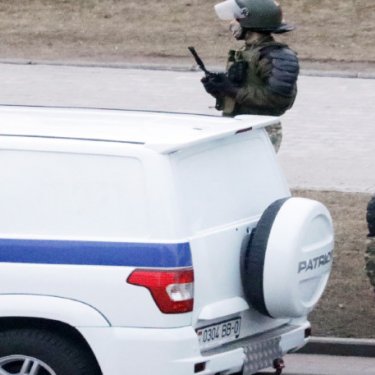Harsh new crackdown on journalists in Belarus

As new protest demonstrations sweep Belarus, preventive detention and lawsuits against journalists have escalated. Reporters Without Borders (RSF) calls on international organisations to take action.
With the arrival of spring, protests against the disputed re-election of President Alexander Lukashenko in August 2020 have resumed. The crackdown has intensified as the security forces are clearly attempting to prevent media coverage of demonstrations.
Nicholas Connolly, correspondent of the German broadcaster Deutsche Welle, was arrested twice in the space of a few days as he filmed a protest in Minsk on 27 March. He was wearing a press vest at the time and showed his official accreditation and his passport. He was taken to the police station and was released five hours later after intervention by the German embassy. The authorities forced him to unlock his phone, threatening to place him in detention and confiscate his equipment.
At least six other journalists were arrested in the Belarusian capital on the same day before they even reached the location of the rally in Bangalore Square. Among them were Hanna Kaltyhina and Halina Ulasik, reporters for the news site Tut.by, who were arrested as they were eating in a local café. Yahor Martsinovich, editor-in-chief of the independent weekly newspaper Nasha Niva, and photographer Nadzeja Buzhan were arrested in their car.
Two days earlier on Freedom Day, the unofficial holiday commemorating the declaration of independence by Belarus, at least four other journalists were arrested and released after a few hours. They included two accredited Russian correspondents, Kirill Krivosheev, of the financial daily Kommersant and photographer Pavel Volkov of the daily Izvestia. Both were questioned as they covered rallies in the main street of Minsk.
In Brest, freelance journalists Milana Kharytonava and Ales Liauchuk were picked up by the police outside the building where they live.
"The authorities are trying to suppress all independent voices and to strike fear into the hearts of journalists,” said Jeanne Cavelier, the head of RSF’s Eastern Europe and Central Asia desk. “RSF hails the courage of those who continue to report on the crackdown in Belarus and calls on international organisations to take action to prevent such harassment and to secure the release of journalists jailed for doing their job.”
The anti-government protests in Belarus may have lost steam this winter but there has been no let-up in the crackdown against journalists. Many reporters – including those indicted during protests after the election in 2020 – have been targeted in a series of raids and some have been prosecuted. Dzianis Ivashyn, known for his stories on the Belarusian police, was accused of “interfering in the activities of a police officer” and could face three years’ imprisonment. He is held in pre-trial detention at an administrative detention centre.
Andrzej Poczobut, a journalist with the Polish state television network TVP Polonia, had his home in Hrodna searched on 25 March and was placed in pre-trial detention pending a criminal case for “incitement to hatred” and a possible five-year sentence. A total of eight journalists are behind bars awaiting trial and three have already been sentenced, on 18 February and 2 March.
At the same time, the authorities are preparing amendments to the media law. According to a document obtained by Tut.by, news sites that report on subjects considered “extremist” could be blocked and news organisations could be stripped of their media status without recourse to the courts. Journalists found to have broken the law, for example by defamation or discrediting public institutions, could lose their accreditation. The draft also provides for a ban on the publication of information considered false or harmful to government interests, or opinion polls without prior authorization, on pain of prosecution.
Ruled by Alexander Lukashenko since 1994, Belarus is ranked 153rd out of 180 countries in RSF's 2020 World Press Freedom Index.



